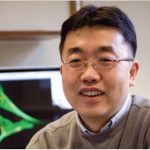
Bumsoo Han
Purdue University
Reverse Engineering of Cellular Signal Processing Machinery during Directed Cell Migration
Abstract: Directed cell migration is ubiquitous in many physiological and pathological processes, including morphogenesis, wound healing, angiogenesis, and metastasis. During these processes, cells sense highly complex microenvironmental cues with chemical, mechanical, and fluidic natures and process these cues to decide the migration direction. Although it has been extensively studied to identify key signaling molecules and networks of the migration, these are not easily translatable to explain the function of cellular signal processing machinery to decipher complex cues. To address this challenge, we characterize and reverse-engineer the migratory behavior of human cancer cells under a precisely controlled microenvironment. This microenvironment on microfluidic platforms is constructed by a 3D collagen matrix whose chemical, mechanical, and fluidic conditions are precisely controlled. Using this platform, the accuracy and persistence of migration are quantified while considering the signal processing capacity of the machinery. The migration characteristics are further analyzed to construct the cellular signal processing machinery capable of comparing and ranking environmental cues to determine the migration direction.
Biosketch: Bumsoo Han is a Professor of Mechanical Engineering and Biomedical Engineering at Purdue University. He is also a Program Leader of Drug Delivery and Molecular Sensing Program of NCI-designated Purdue Center for Cancer Research. His broad research interests are in biotransport phenomena – i.e., transport of matters, energy and information. Current research efforts are focused on the transport of drugs and particles at the tumor microenvironment, disease-on-chip models, and cell-fluid-matrix interaction in stromal tissues. His group has been investigating cell-matrix interaction during the directed migration of fibroblasts and cancer cells. Specifically, his research focuses on how cells sense their surroundings and process information to decide the migration direction. This information includes chemical and mechanical cues, as well as neighboring cells.
He received his Ph.D. in Mechanical Engineering from the University of Minnesota, and his M.S. and B.S. from Seoul National University in Korea. After his Ph.D., he was a Post-doctoral Research Associate in Mechanical and Biomedical Engineering at the University of Minnesota. He received US DOD Postdoctoral Award for Breast Cancer Research, NSF CAREER Award, Faculty Fellowship from U.S. Air Force Research Laboratory (Predictive Toxicology Program), and Richard Skalak Best Paper Award from ASME Journal of Biomechanical Engineering. He is a recipient of the Faculty of Excellence Early Career Research Award from Purdue University and Brain Pool Korea Fellowship from the Ministry of Science of South Korea. He also receives the Discovery Award in Mechanical Engineering at Purdue University. He is a Fellow of ASME.